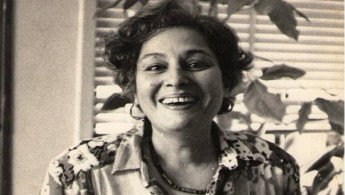Death of a writer: Radwa Ashour
Egyptian writer Radwa Ashour has passed away, aged 68, after a battle against a severe illness. Ashour was known as one of Egypt's most influential novelists and academics, and became an activist fighting for many causes, including Palestine and the independence of Egyptian universities.
Ashour was born in Cairo on 26 May 1946 and studied English at Cairo University. After obtaining a masters degree in comparative literature, she moved to the United States, completing a PhD in African-American literature at the University of Massachusetts.
Activism and academia
Her first literary criticism work was The Road to the Other Tent where she discussed the works of Palestinian writer Ghassan Kanafani. She also published critical studies on Khalil Gibran and William Blake, writing both in Arabic and English.
Despite being an acclaimed academic, teaching at Ain Shams University in Cairo, Ashour became better known for her novels.
In 1983, Ashour published her first work of literature, The Journey: Memoirs of an Egyptian Student in America. This was followed by A Warm Stone, Khadija and Sawsan, and Siraaj.
"I write because I love writing, and I love writing because I am fascinated by life," Ashour said, reflecting on her writing. "It possesses and captivates me, it is confusing and terrifying, and I am completely passionate about it."
It was the historical novel Granada that was to catapult her reputation as a novelist, the first part of a trilogy published in 1994. The book was to win plaudits and awards both in Egypt and abroad.
| It was the historical novel Granada that was to catapult her reputation as a novelist, the first part of a trilogy published in 1994. |
Her novels were translated into English, Italian, Spanish and Indonesian, and often addressed the ideas of human and national liberation. Death became a prominent theme in her work.
Literary legacy
She also wrote the reference guide Arab Women Writers in 2004, and supervised the translation of Part Nine of the Cambridge History of Literary Criticism 2005 in the following year.
The novelist turned her hand to poetry, publishing an anthology of her work with her Palestinian husband, Mourid al-Barghouthi, entitled Midnight and Other Poems. In 2007, Ashour won the coveted Constantine Cavafy Prize for Literature.
Her last literary work was the uncompleted autobiography Heavier than Radwa, published by Cairo's Dar al-Shorouk in 2013. In it she discusses her life, marked by trouble and separation following the deportation of her husband Barghouthi during the rule of Egyptian president Anwar Sadat.
She is survived by her husband Barghouthi, and her son Tamim al-Barghouthi, one of Palestine's most respected poets.
This article is an edited translation from our Arabic edition.



